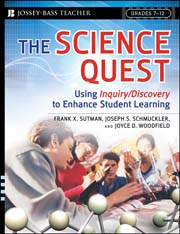
The science quest: using inquiry/discovery to enhance student learning, grades 7-12
Sutman, Frank X.
Schmuckler, Joseph S.
Woodfield, Joyce D.
The Inquiry/Discovery approach is a new instructional model for all scientific subjects. It shows teachers how to design lessons that encourage students toask questions and take initiative in their learning in order to develop critical investigative skills and a deep understanding of scientific processes. Using extensive lesson planning tools, teachers will learn how to structure labs and support hands-on activities that nurture true inquiry learning. INDICE: Preface. About the Authors. The Contibutors. 1. Rethinking How Science Is Taught. Critical Thinking and Inquiry. Understanding Student Inquiry/Discovery. Teaching Strategies for Inquiry/Discovery Learning. 2. Linking Inquiry/Discovery and Content Learning. The Importance of Hands-On Activities. Establishing Learning Goals. Necessary Classroom Tools and Resources. A Sample Lesson: Study of Archimedes' Principle. Instruction Supporting Inquiry/Discovery Lessons. Assessment in Inquiry/Discovery Lessons. Summary. 3. Introducing and Planning Inquiry/Discovery Lessons. Building ‘Rigor’ into Science Learning. Understanding Levels of Student Responsibility: The ‘Instructional Matrix’. The Instructional Matrix in Planning Science Lessons. Designing Inquiry/Discovery Lesson Sequences. Structuring Lessons to Best Meet the Potential of Students. Summary. 4. Inquiry/Discovery Lessons for Middle School. Lesson I: Astronomy (Measuring Distances). Lesson 2: Study of Mass, Volume, and Density. Lesson 3: Energy Conservation. Summary. 5. Inquiry/Discovery Lessons for High School. Lesson 1: Energy, Work, and Power (Physics). Lesson 2: Study of Cell Sizes: A Simulation (Biology). Lesson 3: Effects of Chemicals on Metabolism (Biology and Chemistry). Lesson 4: Study of Hydrogen, Oxygen, and Water (Chemistry). Lesson5: Study of Oxidation and Reduction (Chemistry/Geology). Summary. 6. Supportive Instruction in Language and Team Building. The Scope of Inquiry/Discovery Implementing Higher-Order Student Questioning. Working with Students in Teams. Supportive Strategies for Students with Special Needs. Service Learning as an Incentive for Inquiry/Discovery. Integrating Language Arts and Science: Another Look. Summary. 7. Assessment of Inquiry/Discovery and Content Learning. Assessment Goals in Inquiry/Discovery Instruction. Approaches to Assessment. The Teacher's Shifting Roles in Inquiry/Discovery Assessment. A Balance of Assessment Practices. Summary. 8. Managing Inquiry/Discovery in the Classroom. Homework. Classroom Management. Classroom Laboratory Essentials. Putting It All Together. 9. Looking to the Future: The Globalization Challenge. Support for Dedicated Teachers of Science. Concluding Thought Appendix A: Selected Classroom Resources. Appendix B: Writing Tools. Appendix C: Assessment Tools. References. Index.
- ISBN: 978-0-7879-8586-8
- Editorial: Jossey Bass
- Encuadernacion: Rústica
- Páginas: 224
- Fecha Publicación: 05/03/2008
- Nº Volúmenes: 1
- Idioma: Inglés
